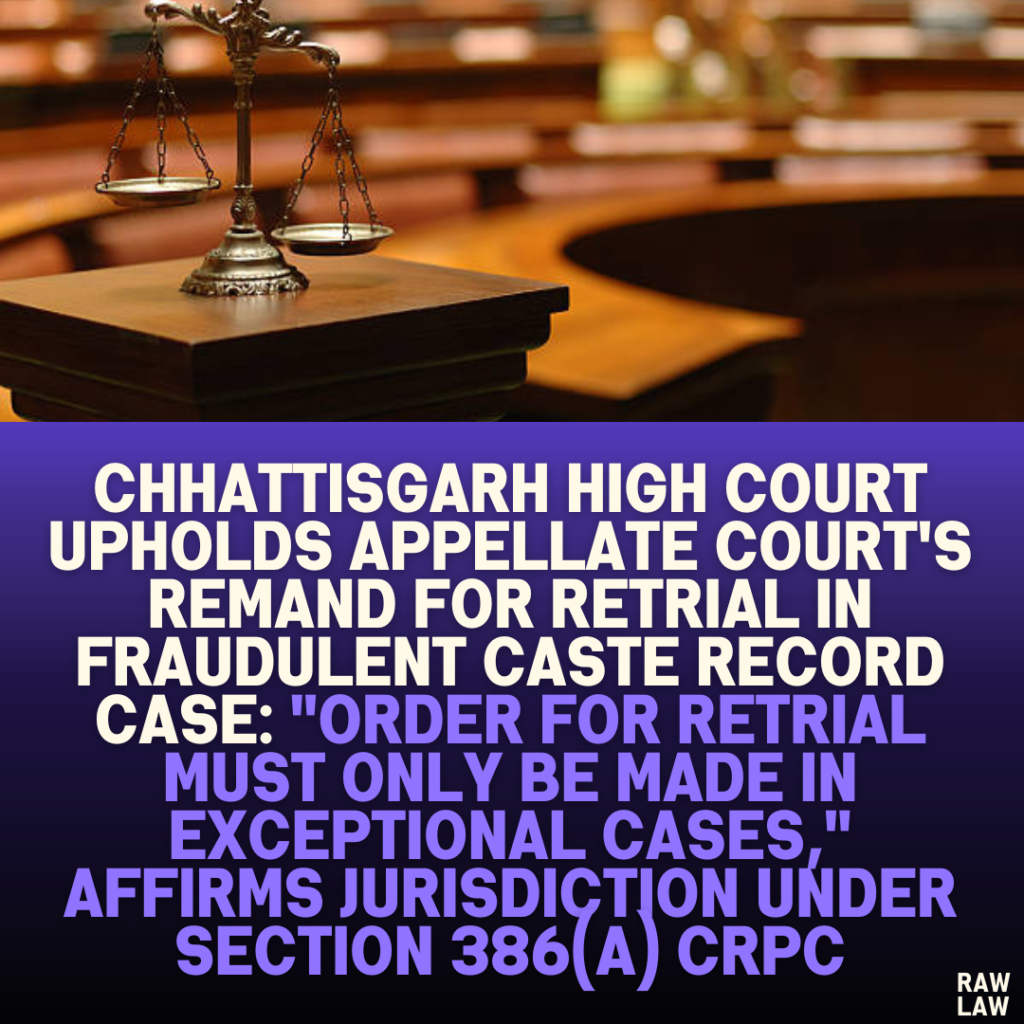Court’s Decision:
The Chhattisgarh High Court dismissed the revisions filed by the accused, challenging the appellate court’s decision to remand the case for re-trial under Section 386(a) of the Criminal Procedure Code (CrPC). The High Court ruled that the appellate court had acted within its jurisdiction and appropriately directed the trial court to reassess the case based on the material already on record. It emphasized that retrials are exceptional measures and must be based on substantive failures in the original trial.
Facts:
- The Complaint:
- The case originated from a complaint alleging fraudulent alteration of caste records to facilitate the illegal sale of tribal agricultural land to non-tribals.
- It was claimed that the accused, in collusion with a Patwari, altered the caste of the seller in revenue records to enable the transaction.
- Prosecution’s Investigation:
- Following an inquiry by the Sub-Divisional Officer, an FIR was registered under Sections 120B, 420, 467, 468, and 471 of the Indian Penal Code (IPC).
- Witnesses were examined, and documents, including the sale deed and revenue records, were seized to substantiate the allegations.
- Trial Court Findings:
- The trial court acquitted the accused, holding that the evidence was insufficient to establish the alleged fraud.
- Key reasons included the lack of corroborative evidence from seizure witnesses and contradictions in the testimony of the complainant.
- Appeal by the State:
- Dissatisfied with the acquittal, the State appealed.
- The appellate court overturned the trial court’s judgment, remanding the matter for retrial with directions to reassess the documentary evidence and, if necessary, call witnesses for further examination.
Issues:
- Was the appellate court justified in remanding the case for retrial under Section 386(a) of the CrPC?
- Did the trial court err in overlooking critical evidence presented by the prosecution?
Petitioner’s Arguments:
- Misuse of Appellate Power:
- The appellate court exceeded its jurisdiction by remanding the case without adequately assessing the evidence itself.
- Prejudice to the Accused:
- The retrial, following nine years of legal proceedings, would cause undue hardship to the accused.
- Improper Application of Section 386(a):
- The retrial order effectively allowed the prosecution to fill gaps in its case, which is impermissible under law.
Respondent’s Arguments:
- Corrective Action by the Appellate Court:
- The appellate court’s order was necessary to rectify errors made by the trial court, particularly its failure to properly assess documentary evidence.
- Conformity with Legal Precedents:
- The remand order was consistent with the principles governing retrials, aimed at ensuring justice is served.
Analysis of the Law:
- Scope of Section 386(a), CrPC:
- Section 386(a) empowers appellate courts to reverse acquittals and order retrials in specific circumstances, such as:
- Jurisdictional errors by the trial court.
- Trials vitiated by serious procedural irregularities.
- Cases where critical evidence was ignored, resulting in a miscarriage of justice.
- Section 386(a) empowers appellate courts to reverse acquittals and order retrials in specific circumstances, such as:
- Legal Precedents Considered:
- Nasib Singh v. State of Punjab (2022):
- Retrials should be ordered only when the trial is fundamentally flawed.
- Ukha Kolhe v. State of Maharashtra (1963):
- Retrials cannot be ordered to fill gaps in the prosecution’s case but are permissible when procedural or jurisdictional errors render the initial trial meaningless.
- Best Bakery Case (2004):
- Retrials are justified when evidence was disregarded, or investigations were tainted.
- Nasib Singh v. State of Punjab (2022):
Precedent Analysis:
The court relied heavily on previous rulings to underscore that retrials must be exceptional and necessitated by significant procedural lapses or injustice. It reiterated that appellate courts have the authority to remand cases, provided such orders are based on sound legal reasoning.
Court’s Reasoning:
- Errors by the Trial Court:
- The trial court failed to consider documentary evidence, including manipulated caste records, despite their importance in proving forgery and fraud.
- Witness testimony, particularly by the investigating officer, substantiated allegations of document tampering, but this was overlooked.
- Role of the Appellate Court:
- The appellate court acted within its jurisdiction by remanding the matter, ensuring that overlooked evidence was reconsidered to avoid a miscarriage of justice.
- The High Court affirmed that the retrial order was not intended to fill lacunae in the prosecution’s case but to rectify omissions by the trial court.
- Exceptional Nature of Retrials:
- The court emphasized that retrials are not a routine remedy and must be exercised cautiously, aligning with principles laid down in previous judgments.
Conclusion:
The High Court dismissed the revisions, holding that:
- The appellate court’s remand order was legally justified.
- The trial court must independently re-evaluate the evidence without being influenced by observations made during the revisions.
- Retrials must be conducted with fairness to all parties, ensuring that justice is neither delayed nor denied.
Implications:
This judgment highlights the appellate court’s critical role in ensuring fair trials by correcting procedural errors. It underscores that while retrials are an exceptional remedy, they are necessary in cases where evidence is improperly evaluated, ensuring the integrity of the judicial process.
